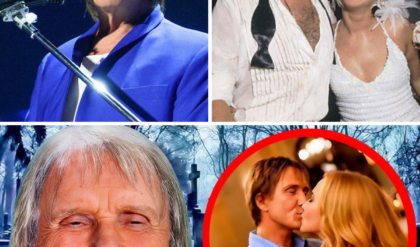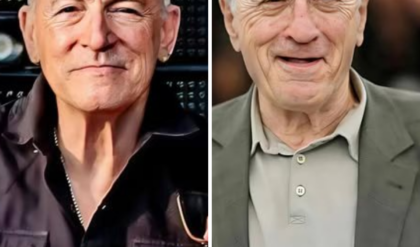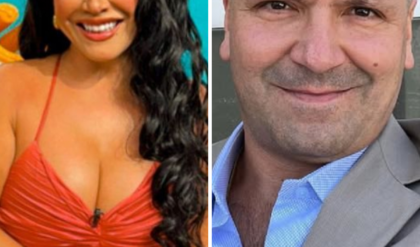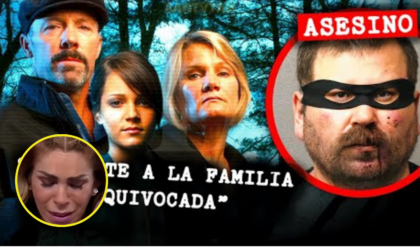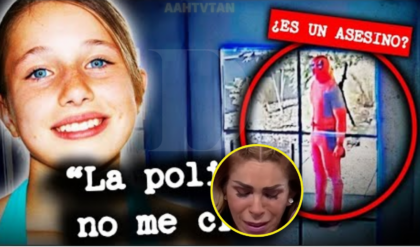Seeing Cynthia Erivo and Ariana Grande in action is a remarkable study in contrasts. Even after months of their omnipresence on social media and TV screens — as fans have consumed every morsel of the ongoing press tour for their film “Wicked,” in which tears have been shed (and shed, and shed!) — it’s hard not to be mesmerized as the London-born theater actor and the Boca Raton-born pop singer, newly minted co-stars, pose for photographs in a New York City studio in early December. Erivo is stoic, silent, channeling the power of her character Elphaba, though once she’s off-camera she lets loose watching her director Jon M. Chu take solo shots: “Give me Calvin Klein, Jon!” she shouts. “C’mon, profile! Work!” And on cue, Chu grows half an inch taller, straightening his spine and adjusting the tilt of his chin.
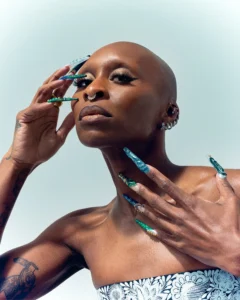
Grande, on the other hand, seems never to stop singing, harmonizing to a playlist that ranges from Whitney Houston’s “Higher Love” to Mariah Carey’s “Always Be My Baby” in a voice that sounds subtly different from the one that made “Thank U, Next” and “God Is a Woman” into pop sensations. Like her character Galinda, she sings in an operatic tone, with consonants more sharply drawn than they’d be on a Grande album.
Speaking later with a puffer jacket on to fight the chill of our room and a big iced coffee in hand, Grande reflects on her new voice — a sign that though production may have wrapped, she’s still in Oz.
“Maybe people underestimate how long we spent finding and disappearing into these women,” Grande says. “So when certain inflections or mannerisms take time to melt away, sometimes people poke fun. But we had a job to do, and we had things to get lost in — because that’s what the piece required.”
It’s hard not to be struck, in Grande’s speaking voice as well, by a new quality that feels very old-school: the swaggering crispness of a 1940s movie idol. “I think that might stay,” she says of her newfound enunciation. “Galinda required a lot of vocal work for me. Certain things maybe won’t melt away. Some will, but I’m really grateful for the pieces that will stay with us forever. What a beautiful thing to be left with, and to feel the ghost of every day.” She takes a long pause. “And, you know, I’m still looking for my eyebrows.” (Grande has cycled through looks as she’s reinvented herself throughout her career, and these days, her daintily shaped, honey-blond eyebrows are still in their Galinda era.) “I’ll let you know if I find them — I hope I don’t.”
And if the “Wicked” takeover of popular culture has made anything clear, it’s likely she’ll keep searching. For Grande, Erivo and Chu haven’t yet left Oz — and neither have any of us. With $600 million and counting at the global box office, four Golden Globe nominations, a path to potential Oscar glory and a sequel, “Wicked: For Good,” looming on the horizon, “Wicked” has done for its witchy shade of green what “Barbie” did for Mattel stiletto pink. It’s leveraged a familiar property, put it in front of underserved female audiences and watched as the world discovered its story in a whole new light.
It’s a remarkable, and somewhat surprising, cherry on top of the decades’ worth of success of the Broadway production. Adapted from Gregory Maguire’s novel about the untold backstory of “The Wizard of Oz”’s villainous Wicked Witch of the West (recast here as Elphaba, a pure-hearted social outcast who makes an easy scapegoat for the fascistic Wizard), “Wicked,” a collaboration between producer Marc Platt, composer Stephen Schwartz and writer Winnie Holzman, was first performed on Broadway in 2003. But after the show became bigger than “Cats” for a new generation of fans, Platt felt trepidation about bringing it to the screen (even though he’d held the film rights to the novel before Schwartz had written a note).
The moment had never quite been right: Once the stage show took off, Platt says, “I knew the bar would be extremely high. I wanted to have the confidence that it would be as terrific as it could be, and I found that slightly daunting.”
The hiring of Chu — best known for directing “Crazy Rich Asians” and the film musical “In the Heights,” which had the misfortune of seeing its 2021 theatrical release wiped out by moviegoers’ changed habits in the wake of peak COVID — opened the world up. “He has an intuition that is very musical — how he moves the camera and how his films flow, and that’s something you can’t teach,” Platt says.
But at the heart of “Wicked”’s success, too, is one extraordinary partnership, one that was cemented before filming together even began.
And now that legions of fans have gotten to see the film, Grande and Erivo are feeling liberated, ready to answer the remaining burning questions about the production. “Now that it’s the world’s, it feels like there’s so much more to talk about,” Grande says.
Take the tabloid rumor that Grande got paid more than Erivo — much more. Not so.
“We went through our contracts together,” Grande says, “and called each other up. ‘Did you see that? What do you think about that? Let’s get it together!’”
Universal Pictures, which distributed “Wicked,” made the unusual decision of issuing a statement in November to clarify that the actors received equal pay for the films. “This is a modern production,” Chu elaborates, sitting next to Grande and Erivo in a stylish black suit. “This is what Hollywood should reflect. These are co-CEOs of ‘Wicked,’ Inc.”
“We both went through it — ‘What number are we doing? How do you feel about that?’ We were really fucking honest,” Erivo says. “And that’s really rare. People don’t do that.”
“We’re very different, but when we’re doing something like this together, her needs become my needs,” Grande says.
Erivo, not breaking Grande’s gaze, replies, “And her needs become mine.”
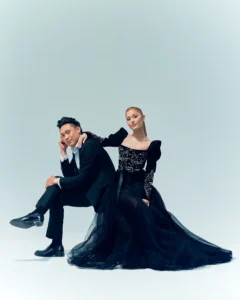
They’ve leaned on each other a great deal: Since the lengthy production of both halves of the “Wicked” story in 2023, Erivo and Grande have crisscrossed the globe to discuss their characters’ journeys. The sobbing in some of the interviews has left spectators a bit astounded. Are the pair taking care of themselves?
“We are,” Grande says. “I feel so grateful and proud of how present we’ve been able to be. A lot of people have come up to us and been like, ‘How you holding up?’ with a long face. And we’ve just peeked at each other and been like, we’re grateful and floating.”
“We had a good time,” Erivo adds.
And yet, the tears return today. As Grande is talking about how she and Erivo have been supporting each other, her eyes start to water.
Suddenly, her voice becomes that Galinda singsong as she trills out, “But I won’t get emotional!” She taps the bridge of her nose, murmuring in frustration, “Oh my God, stop it!” before allowing her voice to crack. “The most special stuff is unseen,” she concludes. “We can giggle at it all we want, because we’re quite funny. I’ve watched and had a giggle. But it is really a privilege to work and feel this way, not just as an actress in a movie but as a human being with other human beings who care — yes, about the work, but about each other.” Her eyes glint with tears, and — in Grande’s presence, as opposed to watching a junket interview sent around as a meme — there’s a startling quality to just how emotionally open she’s become.
Her tone has grown rushed — and it’s proof positive she’s stuck with the Galinda voice, because she’s speaking in it even as she’s beginning to lose control. Chu swoops in to finish her thought. “I think we needed this movie as much as the world needs this movie,” he says.
No kidding. For Chu, the project represents the break of a lifetime, the opportunity for the film-buff son of immigrant parents to make his own elaborate saga and, eventually, to meet a hero or two. “It’s a very lonely job, being a director,” he says. “But I’ve been getting so many beautiful calls from other directors — I’ve never gotten that kind of outreach.” Particularly head-spinning for a filmmaker who grew up addicted to “Star Wars” was a recent FaceTime with George Lucas. “He was like, ‘I know how hard it is to do all those elements. We should spend some time together.’ I’m like, ‘Yes, what’s your address?!’”
“I’m outside, actually!” Grande teases. For her, too, “Wicked” is a meet-your-idols moment; she first saw the stage show as a child with the original cast of Idina Menzel as Elphaba and Kristin Chenoweth as Galinda (both make cameos in the film). And for Erivo, Elphaba represented a sort of overcoming. Erivo found the Ozdust Ballroom sequence, in which Elphaba walks into a party only to realize that she is being mocked and treated as a pariah, especially cathartic. “I was talking to a friend earlier this week,” she says, “and he was like, ‘I just want to confirm for you that you were bullied.’ This moment gave me the opportunity to revisit, process, feel it again and share it.”
Later in our conversation, Grande brings the sequence up again, when describing the film-opening flash-forward sequence in which Galinda, now reigning as Glinda the Good Witch, sets fire to an effigy of Elphaba. “Much like how hard the Ozdust felt for you, that’s how it felt to light you on fire a million times in a row!” The sequence was shot after “For Good,” the fan-favorite song that closes the sequel and gives it its name. In it, Elphaba and Galinda profess their undying friendship; suffice it to say that Grande found the notion of treating her co-star with violent hostility an acting challenge. She now says the only thing that got her through lighting Elphaba up, time and again, was Chu’s whispered encouragement to “be strong.”
“We were really in it,” Grande says, “and really lost in the sauce.”
“Wicked” lands, accidentally, at a moment in which its themes of female collaboration against tyranny take on a certain resonance. This is perhaps nothing new for the story: Maguire’s 1995 novel was inspired by the author’s perception of media propaganda during the first Gulf War, and the 2003 stage musical was read by some as a broadside against George W. Bush during that war’s sequel. The Wizard (played here by Jeff Goldblum), unable to convince Elphaba to aid him in his scheme to enslave Oz’s animals, instead paints her as a villain to the credulous townspeople.
“When Winnie and I started writing the show,” Schwartz says, “some of the Wizard was based on Bill Clinton. And by the time the show opened, we had the Iraq War, sold to the public through false information. I guess if musical theater had an impact on the world, we’d live in a better world. The political themes are unfortunately more relevant.”
After all, we’re living in the wake of Donald Trump’s second election as president, and the film that’s captured the zeitgeist is all about … “dictatorship,” Grande says with a mordant chuckle.
Real-world political turmoil and “Wicked” seem to go together as well as, well, green and pink. “When ‘Wicked’ first came out on Broadway, I remember the people in my life having that exact discussion,” Grande continues, reflecting on Elphaba and Galinda’s unlikely, and politically instructive, friendship. “It’s time for people to say, ‘Oh, how can I be a better ally?’ Because that’s how we’ve always survived. We’ve always been able to survive with those friendships and those allies.”
All of which makes clear why the blockbuster story of a green-skinned witch has earned the unlikely label of most politically charged film in the Oscar race. “The thing that keeps coming back to me is how much people need it,” Erivo says. “It gives people the permission to think of themselves as people that can help. It might not be easy, but it isn’t impossible. That’s the sort of thing that permeates.”
And Erivo’s casting represents its own kind of change. On the stage, only one Black woman has played Elphaba — Alexia Khadime, in the London production from 2008 to 2010 and again in a run that continues to this day. “I knew there was a long line of history behind me, and you take the responsibility on and you have to let it go,” Erivo says. “My responsibility is to hold that, see it, understand it, respect it and then create my own. If I’m trying to do something that came before, then I’m not in the room.”
Given that “Wicked” has been playing on Broadway for more than two decades, its every note is by now well known to devotees who’ve spent that time re-listening to the original cast recording. Which meant that a careful balance was needed between honoring what had come before and reinvention. Recording “Defying Gravity” for a track to use during rehearsals, Erivo first mimicked original Broadway cast member Idina Menzel’s version of “the battle cry.” (Transcribed, it looks like “ah-AHHH-ahhh!”)
She recalls that Schwartz and musical director Stephen Oremus said to her, “Well done. Now, what’s yours?”
“I kept trying something, and eventually, something felt like me,” she says. “What’s the guttural cry that I would make? That was the thing that came out.” Erivo’s version is shot through with a deeper pain than the original, and it hits a few more notes on its way to completion. It’s cinematic — fittingly so.
“You say you kept trying,” Grande jumps in. “But I was there, and I think it was maybe the second or third time.” She laughs, but then shifts on a dime to Broadway-ballad earnestness. “It was right under the surface, waiting to come out. You just needed that green light. You didn’t keep trying. No, that was yours.”
Though Grande and Erivo play bitter rivals — at least at first, as Grande’s hyperbolic mean girl and Erivo’s lonely outcast butt heads as college roommates before teaming up — they were united in the goal of making “Wicked” their own. Erivo put her stamp on “Defying Gravity”; for Grande’s big solo number, “Popular,” the pop singer resisted calls to make it too commercial.
“In the original rehearsal track, they had hip-hop drums,” Grande says, clarifying that it wasn’t meant to make “Popular” sound like an Ariana Grande album track, exactly — it was just meant to modernize the song. “I wanted to lovingly and respectfully say, ‘Absolutely not!’ Thinking through the lens of the character — Galinda Upland does not have that bounce to her at all. She’s as vanilla as they come.”
Grande heard the updated track upon arriving in London in the fall of 2022 to start rehearsals. “I called Jon first. I was shaking. Is this something that we can meet in the middle on?” she says. “And of course, it was so understood. And that’s what happens when you have a team who loves and respects each other and can hear those truths, because nothing has to be withheld.”
However, Grande, a gay icon since she broke out as a pop star, embroidered an element onto the story that isn’t in the text; she’s said that she thinks Galinda is a bit queer. Asked to elaborate, she explains: “I think she’s a person who loves so much, and I do think that it goes beyond gender, and I think that’s a common theme in Oz. I also think that the ways in which she loves Elphaba so much, and that forgiveness and that unconditional love that they share — I think they’re in love with each other. I know, yes, it’s platonic …” She cuts herself off before she can say too much; this many press engagements in, she knows the game. “But we’ll talk about it more in depth in movie two.”
Before then, there are the Oscars, in which Chu, Grande and Erivo are all formidable contenders. (Platt, in conversation, notes that “Wicked” lost a hard-fought campaign for the best musical Tony to “Avenue Q”: “Everyone says it’s going to win the Tony; it didn’t, and it’s still the most beautiful experience.”)
“I never really know how to respond when the question of awards comes up. It’s not my raison d’être,” Erivo says. Then again, she’s already won a Grammy, an Emmy and a Tony for her role as Celie in the 2015 revival of “The Color Purple” — making her just an Oscar shy of EGOT status. “Do awards help for getting some space to create more? Yes, but what else can we do? I just want to continue making fucking fabulous work and widening the aperture on what’s possible for women who look like me in film.” (A recently announced first-look deal between Universal and Erivo’s production shingle,
Edith’s Daughter, will likely help her do just that.)
“Maybe it can be fruitful beyond making a movie — maybe it can actually be fruitful for our lives,” Erivo goes on. “Why not more?”
“Indeed,” Grande adds. “And I can’t wait to be in the audience for all of it. But you, Miss Elphaba, deserve your flowers, and I can’t wait to hold your train as you get that EGOT — and your gummy vitamins, and your thermos.” (The always-equipped Erivo, caring for a voice that can reach the back row of a Broadway house, does not travel light.)
The original “Wicked” put forward both of its actresses as leads for the Tonys; Menzel, playing Elphaba, won the prize. For the film, Grande is running in the supporting actress category. “I’m just honored to have been that support for Cynthia’s performance, and to be able to be a part of this,” she says. “That’s how I feel.” She turns to address Erivo. “The supporting character, actor, friend, sister to what you have done in this film, which is otherworldly.”
Erivo returns the compliment, naturally. “I will raise hell if this lady does not get her nomination. It’s a really fucking hard job to jump into the middle of something like this and have it be your first time.”
Grande’s voice has an extra Galindan quiver; her lip twitches slightly. “That’s very kind.”
“Lucille Ball: She’s the return of that,” Erivo says. “And it made her heart happy to do this, which makes me happy.”
“I love you,” Grande murmurs. “That’s very kind.”
Regardless of what happens in March, all parties have seen their careers changed, well, for good: Erivo, an Oscar nominee for 2019’s “Harriet,” is now a box office star, while Grande has established herself outside the recording industry. And Chu looks likely to become an even more in-demand director; in fact, two forthcoming projects — adaptations of the musical “Joseph and the Amazing Technicolor Dreamcoat” and Britney Spears’ memoir “The Woman in Me” — have been announced. “I sort of wait until someone tells me it’s time to be made,” he says of those films. “There is an urgency in both, but I’ve got to focus in on movie two.”
It’s no secret that the back half of “Wicked” is knottier, darker and far more complicated. “It gets messy,” Chu says. Will audiences, accustomed to the candy-coated brightness of “Popular” and “Dancing Through Life,” come along? “I think if they’re following the emotions of this movie,” he says, “they’ll walk with us.”
One element fans of the franchise are likely anticipating today as avidly as they awaited Erivo’s barn-burning “Defying Gravity” this time last year? “For Good,” in which the briefly reunited witches sing of what each has meant to the other.
“The scene that leads up to it — and afterwards — is quite a meal,” says Grande, measuring her words carefully to avoid spoilers. “I do remember, at a point, leaving my body and hovering for, like, the whole week.”
“That was …,” Erivo says, trailing off. There are months of promotional obligations to go, and then next year, she’ll be able to discuss “For Good” in detail. For now, all she can share is a memory. “That was a lot.”
